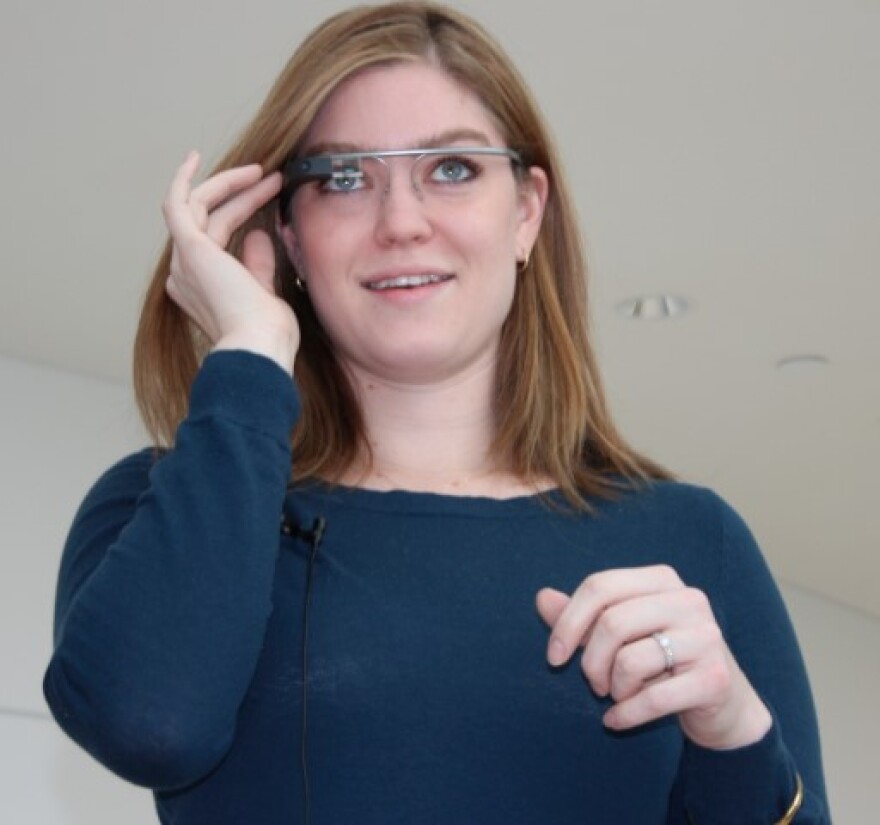Google Glass has been in the news lately as more people are trying it out. This wearable technology is still in the beta version, but about 10,000 people are now testing it, including a Kansas City-based mobile development firm. And in January, they partnered with the Kansas City Symphony – to provide four different views on stage.
Living with devices since the beginning of mobile
In the River Market offices of Engage Mobile Solutions, at the top of a long flight of stairs, president Matthew Barksdale stands in front of a desk. Propped up, or lying flat on the surface, there’s a collection of mobile devices through the years, such as a clunky Apple Newton PDA first developed in the 1980's.
"This is 8 inches tall, by four inches wide and an inch thick," describes Barksdale. "(It) had very limited application." Through the 1990's and 2000's, the devices got smaller as the technology improved. There's a PalmPilot, a BlackBerry, the first Android, and today’s smart phones.
Barksdale says company staffers have been involved with mobile from the beginning. "And now, we’re really focused on what’s next," he says.
And what’s next just might be Google Glass.
A new way of looking from the stage of Helzberg Hall
It's a Friday morning just about 11 a.m. during a break in the Kansas City Symphony’s rehearsal. For the next piece, Beethoven's Fifth Symphony, three musicians and music director Michael Stern, will be wearing Google Glass – and recording the experience from their own perspective.
In the lobby of the Kauffman Center for the Performing Arts, Matthew Barksdale walks horn player Elizabeth Gray through operating the eyeglass frame. It has a screen the size of a thumbnail over the right eye and takes pictures and videos with the swipe of a finger, a head movement, or a voice command.
"So what you want to do is tap the side," suggests Barksdale. "Just tap it," Gray replies. "Oh, hello. It says, 'Join the network.'"

The Symphony’s Evan Halloin plays the double bass – and he’s also trying on a pair. "I think what this will do is give people the view of what we see from the stage, which I always think is the best seat in the house," he says.
After the rehearsal, Michael Stern says wearing Google Glass reminds him of the ticker tape scrolling at the bottom of a TV news broadcast.
"It’s forced multitasking," Stern says. "It took at a little time getting used to, but then it was seamless. It was sort of transparent."
Test-driving new technology
Google Glass is a new technology in search of real life applications. In 2013, Google signed up 8,000 "Explorers," people willing to find ways to use Glass - and also able to spend $1500.
Engage Mobile’s founder and CEO Darrin Clawson is one of those Explorers. He says to get into the program they were required to pitch an idea on Twitter or Google Plus, in 50 words or less. Theirs was a personal health scenario: how a diabetic might use the technology to manage blood sugar levels.

"We’ve been looking at how Google Glass might be used in construction, education, health care, sports, fitness, just so many areas," Clawson says.
Google Glass isn’t broadly available yet, it’s expected to be released later this year. But there are already concerns about privacy and safety. A handful of states, including Missouri, have proposed legislation to penalize drivers wearing Glass.
Engage Mobile's Matthew Barksdale says nobody really understands the full dangers - or potential - of the technology yet.
"I think what’s really exciting about Glass is not what it does now," Barksdale says. "But what this type of technology can do three or five years from now."





